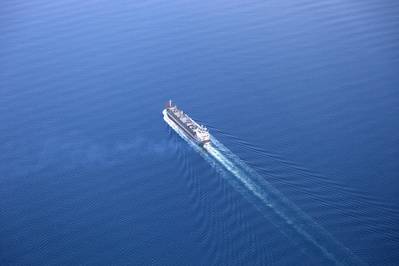New Study Explores Converting Existing Vessels for Zero-carbon Operations
A group of shipping industry partners are working together to assess the technical, financial and environmental potential of converting existing vessels to zero-carbon fuels and technology as part of the transition to a global zero carbon fleet by 2050.
American Bureau of Shipping (ABS), A.P. Moller – Maersk, MAN Energy Solutions, Mitsubishi Heavy Industries, NYK Line, Seaspan Corporation and Total are joining forces through the Mærsk Mc-Kinney Møller Center for Zero Carbon Shipping to assess the technical, financial and environmental potential of converting existing vessels to zero carbon fuels and technology as part of the transition to a global zero carbon fleet by 2050.
The project aims to assess conversion options and derisk asset investments by analyzing the emission reduction potential as well as techno-economic opportunity of converting vessels currently fueled by fossil-based fuels to zero or neutral carbon fuel solutions. In addition, the project will identify a number of technical modifications of relevance for today’s newbuilds to reduce the cost of future conversions, thus minimizing the associated financial risk for ship owners.
Project partners will address various vessel types including containerships, tankers and bulk carriers and their potential conversion from conventional fuel oil, or integration with more recent fuels such liquefied natural gas (LNG) and liquefied petroleum gas (LPG), to enable pathways with future solutions such as ammonia or methanol as well as the application of onboard carbon capture and storage (CCS).
For each pathway, the related safety aspects will be reviewed, and the financial assessment will cover items such as conversion, technology and fuel costs as well as associated operating costs, whereas the environment assessment will, among other things, cover the greenhouse gas reduction potential over the lifetime of a vessel.
The project is facilitated by the Mærsk Mc-Kinney Møller Center for Zero Carbon Shipping and fully funded by the involved parties. As strategic partners to the center, the partners have committed to the center’s collaboration model by which they assign experts to the center as secondees working at the center and with other partners through projects and activities.
“In order to accelerate the investments in a zero carbon maritime value chain, we have to reduce the risk of stranded assets. With this project, we address that challenge by providing clarity and overview of the operational fuel and technology options, their associated environmental and financial impact as well as their transition pathways,” said Claus Winter Graugaard, Head of Onboard Vessel Solutions, the Mærsk Mc-Kinney Møller Center for Zero Carbon Shipping.
“This is a vitally important piece of work for the industry. We are assessing the opportunities and consequences of converting ships from fossil-based fuels to zero or neutral carbon fuel solution, which is something every ship owner and operator urgently needs actionable insight into. This project will turn the industry’s decarbonization ambitions into a series of actionable steps, a pathway for each vessel type to carbon free operations,” said Georgios Plevrakis, ABS Director, Global Sustainability.
“To accelerate the transition to carbon-neutral or zero-carbon fuels, it is not enough to focus solely on newbuilt dual fuel vessels. We must also look into retrofitting existing vessels in our fleet to operate on carbon-neutral or zero-carbon fuels. With our participation in this project, we want to investigate retrofit possibilities for existing vessels enabling dual-fuel operation on either methanol or ammonia as well as conventional fuel oil,” said Ole Graa Jakobsen, Head of Fleet Technology, A.P. Moller – Maersk
“Through the long experience in developing high efficient and state of the art designed vessels, and also as a supplier of marine machineries equipped to more than 50% of existing deep sea vessels in the globe, we, MHI Group are very glad to contribute to global environment improvement not only for today’s urgent issues of EEXI and CII, but also decarbonization of existing vessels through this challenging ‘Conversion Optionality Study’ with the excellent partners,” said Tomoo Kuzu, Senior Executive Vice President of Mitsubishi Heavy Industries Marine Machinery & Equipment Co., Ltd.














